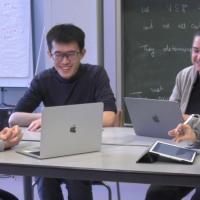
Contagious maths, Part 5: Meet the researchers!
This content is the final part of our Contagious maths project. Click here to see the other parts.
We hope you've enjoyed having a chance in this series to explore epidemics and the mathematical models used to understand them. Finally, we thought you might like to hear more from Julia Gog, the disease modeller from the University of Cambridge who guided us through the series, and some of her colleagues, and find out what questions they are currently exploring in their own work. You can find out what Julia and her colleagues Petra Klepac, Maria Alegria Gutierrez and Desmond Lai from the University of Cambridge, are up to in the videos below. You can hear from more of Julia's colleagues in our podcast series On the mathematical frontline, and find out about their work in this collection of articles.
Julia Gog
Here's Julia, talking about an important question. Suppose you have a vaccine for a disease but only a limited number of vaccine doses. How would you choose the people to give the vaccine to? The answer involves mathematical, medical, as well as ethical considerations.
Petra Klepac
Here is Dr Petra Klepac, a researcher at the University of Cambridge. She talks about a fascinating citizen science project called Contagion! The BBC Four Pandemic that was designed to figure out people's contact patterns — because in order to assess how an epidemic is likely to spread you need to have an idea of who meets who.
Maria Alegria Gutierrez
Next is Maria Alegria Gutierrez, a PhD student at the University of Cambridge, talking about her work investigating how viruses change over time.
Desmond Lai
And finally, here is Desmond Lai, also a PhD student at the University of Cambridge, talking about his work exploring how the immunity someone may have gained to a disease can lessen over time.
These Contagious Maths resources were developed and written by Julia Gog and the MMP team, including both NRICH and Plus, and funded by the Royal Society’s Rosalind Franklin Award 2020. We have tailored these resources for ages 11-14 on NRICH, and for older students and wider audiences on Plus.